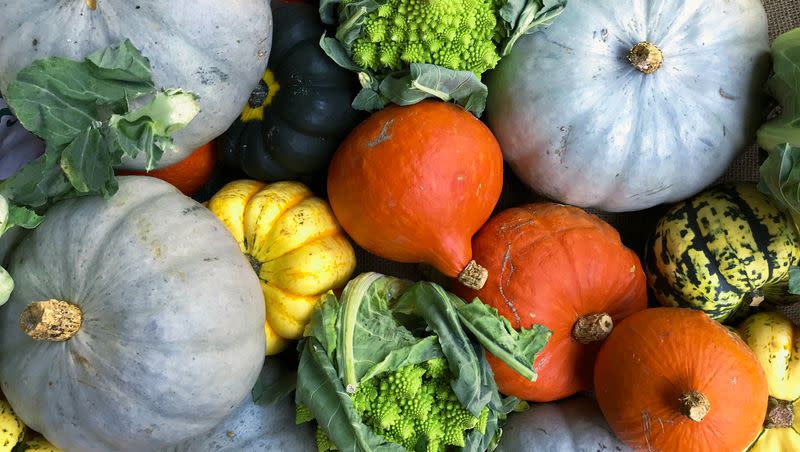10 fall superfoods to promote heart, gut and brain health

Fall is the time of year when the harvest is full and feasts are had. But it’s also the time of year when the sun goes away for longer and seasonal depression can affect more people.
Fortunately, the fall harvest is packed with superfoods that can boost your health and immune system.
Related
What are the best vegetables to eat in the fall?
1. Beets
A nutrient-packed superfood, beets are often overlooked but contain almost all of the minerals and vitamins that the body needs, including manganese, copper, potassium, magnesium, vitamins C and B6, and iron, which can help with bone formation to brain function, per Healthline.
The veggie is also known to lower blood pressure if eaten regularly and reduce inflammation associated with obesity and diseases like cancer and liver disease.
2. Brussels sprouts
These mini-cabbages are full of fiber and support our gut-lining health by providing sulfur to our system, per BBC. They are also linked to cancer-protective compounds and support a healthy heart.
A study published in the Journal of Diabetes Investigation found that high-fiber vegetables like Brussels sprouts could even reduce the risk of Type 2 diabetes.
3. Pumpkin
Perhaps the seasonal favorite across the United States, the pumpkin is known for its bright orange color. The color comes from the vegetable's beta-carotene, which converts to vitamin A in the body and is great for skin and protecting your eyes, per the Academy of Nutrition and Diabetics.
Healthline reported that a major reason this veggie is considered a superfood is for its ability to boost the immune system and support good skin health by providing vitamin C, vitamin E, iron and folate in addition to vitamin A.
There’s also some evidence that Healthline mentioned that pumpkins can help with weight loss.
4. Sweet potatoes
Sweet potatoes are a great source of vitamin B6, potassium, fiber, vitamin C and beta-carotene — which helps the body make vitamin A, per Harvard School of Public Health.
Potassium is an electrolyte that helps the body maintain normal fluid levels and has been found to support muscle contraction and regulate blood pressure, per Harvard.
5. Kale
I saved the best for last because kale is — as the author of “The 150 Healthiest Foods on Earth,” Jonny Bowden, put it — a “nutritional powerhouse” packed with calcium, iron, and vitamins A, C and K.
Kale can protect against cancer-causing agents and muscular degeneration.
Bowden also wrote that kale has sulforaphane, which boosts detoxification in the body, making it a popular health food.
Related
What are the best fruits to eat in the fall?
1. Apples
As reported by the Deseret News’ Gitanjali Poonia, experts have found that apples can reduce the risks of stroke, high blood pressure and cholesterol levels.
One study published in the Journal of Food Science concluded that an apple’s vitamins, minerals, ability to keep chronic diseases at bay and other additional health benefits “could indeed ‘keep the doctor away.’”
Related
2. Dates
Technically a berry, dates come from a palm tree and have several health benefits.
A rich source of antioxidants, prebiotics and vitamins, dates have been proven to aid in heart and gut health and prevent diabetes, cardiovascular and neurodegenerative diseases, per Forbes Health. There’s also been research on dates’ effects on being a natural labor and delivery aid.
Their sweetness also acts as a healthier sugar alternative.
3. Pears
Pears offer an assortment of vitamins and minerals, including vitamin C, potassium and dietary fiber, per one study.
The head researcher of the study, Joanne Slavin from the University of Minnesota, St. Paul, wrote that “Americans fall short on dietary fiber” and that “the high content of dietary fiber in pears and their effects on gut health set pears apart from other fruit and deserves further study.”
4. Pomegranates
In addition to pomegranates’ support of the gut microbiome, the fruit helps keep the skin healthy and fortifies its internal barrier, per experts from the University of California, Los Angeles.
There’s also some evidence to suggest that pomegranate juice can slow the rate of memory loss that comes with getting older, as well as include anti-inflammatory properties to ease inflammatory bowel disease and support urinary health.
5. Cranberries
Filled with vitamins E, K1 and C and copper, cranberries are best known in the form of juice and their ability to prevent urinary tract infections, Healthline reported.
Surprisingly, cranberries also contact a specific A-type proanthocyanidin, which could prevent colon cancer-causing agents from attaching to the stomach lining, reducing the risk of stomach cancer and ulcers.
Related
How can I eat healthy in the fall?
A lot of the season’s superfruits, like apples and pears, can be chopped or sliced to be taken on the go as an easy snack.
Fall’s superfoods like pumpkin, beets or sweet potatoes are better meal-prepped and pulled out for easy sweet or savory go-to snacks and dinners you’ll eat all season long.
Incorporating these fruits and veggies into savory or sweet sauces could be an easy way to incorporate more of the benefits and less of the taste (if you’re not a fan).
But a one-size-fits-all scenario would be to add these superfoods to the food you’re already used to eating. A recent TikTok trend has suggested that while eating the food you do enjoy, add something to it that’s healthy.
Related

